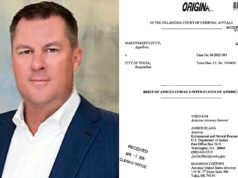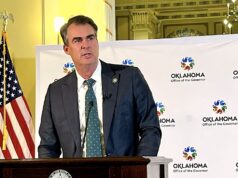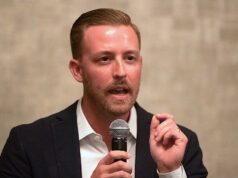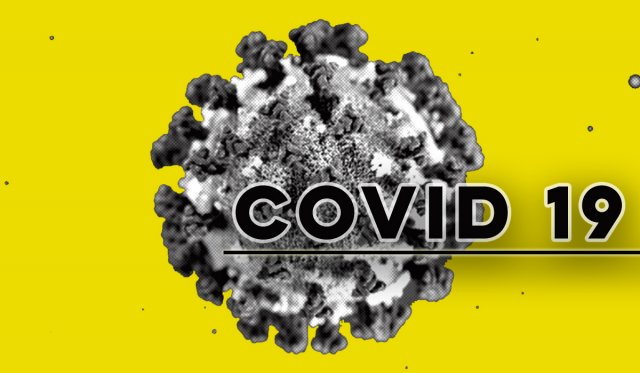

The COVID-19 pandemic’s overwhelming nature can be seen in its barrage of media coverage, which can seem impossible to consume. International, national and local narratives are competing with one another for attention, and the whole world — glued to various screens for the latest information — is trying to find confidence in the known and acceptance of the unknown.
Amid this information overload, truly extraordinary facts easily escape community consumption, even in the bite-sized world of social media. Take, for instance, a March 19 press release from INTEGRIS Health, Oklahoma’s largest network of hospitals by bed count. In a subtle foreshadowing of troubles to come, INTEGRIS asked for community donations of personal protective equipment (PPE) such as gloves, masks and other safety items. The press release suggested occupations that might be able to donate PPE: dentists, veterinarians, construction workers and painters.
That’s right. Faced with a global pandemic, the world’s most expensive health care system lacks basic supplies to protect employees and patients from communicable disease, leaving a billion-dollar hospital group to beg for donations from construction workers.
Of course, that will be far from the final shocking tidbit to chew on in the coming weeks. With much of society shutting or slowing down, most Americans have more time than ever to consume the news and wonder what to make of it.
As you start your Monday, we have blown the dust off the old “filter” to highlight a few components of COVID-19 coverage. This global story is moving quickly, so here are a few things worth following.
The numbers
In trying to understand the scope and spread of COVID-19, everyone, from scientists to couch potatoes, is looking at the data. The only problem is that numbers we have about the coronavirus are particularly imperfect. Testing capabilities are severely limited in Oklahoma and elsewhere thanks to several issues, including an international shortage of a reagent that is used to process COVID-19 tests. So the numbers of confirmed cases reported nightly by news outlets barely speak to the presumed spread of COVID-19. Still, the available figures act as an entry point for assessing the situation. Consider:
- Monday, the Oklahoma State Department of Health announced that the state’s confirmed positive tests have climbed to 81. Officials also said on Sunday that a second Oklahoman — a Pawnee County man in his 50s — had died.
- Worldwide, more than 267,000 cases of novel coronavirus have been confirmed, according to the World Health Organization. In the U.S., more than 15,000 cases now exist, only one-third of the total in Italy, which has been ravaged by the virus.
- Approximately 13,000 people have died worldwide, with 201 deaths in the U.S., according to the WHO.
- Speaking of Italy, more than 600 people died there Friday, and more than 700 people died Saturday. The Italian situation remains quite complicated, with disease management made more difficult by the fact Italy’s population is the fifth-oldest by median age in the world.
The people
America’s Health Insurance Portability and Accountability Act (HIPAA) provides privacy for individual patients in the U.S. health system. That means even those working inside a building where someone tested positive for COVID-19 are unlikely to learn that person’s identity. As a result, stories about actual patients have been few and far between, and even the ones that have become public are difficult to put into perspective owing to limited data points. Consider:
- Hospitalized OKC attorney Chris Sloan’s comments in The Oklahoman describe his COVID-19 infection as “one of the worst experiences” of his life.
- Norman resident Manda Nelson told The Frontier that her experience with COVID-19 has been “surreal.” At the time of the article’s publication, Nelson was “self-quarantined” and not hospitalized.
- Another person who tested positive in Oklahoma was Utah Jazz guard Donovan Mitchell, whose test came after a teammate’s diagnosis. Mitchell went home to isolation after the test, but he appeared March 16 on Good Morning America with an awkward summary of his health status: “I’m fine.” Like other NBA players and even U.S. Sen. Rand Paul, Mitchell’s positive test while being asymptomatic highlights the risk for community spread.
- But on the other end of the COVID-19 spectrum is the case of Merle Dry, the first Oklahoman — and citizen of the Cherokee Nation — to succumb to the virus. A Berryhill resident, the 55-year-old Dry died March 18. The name of the second Oklahoma to die from COVID-19 has yet to be released.
The public
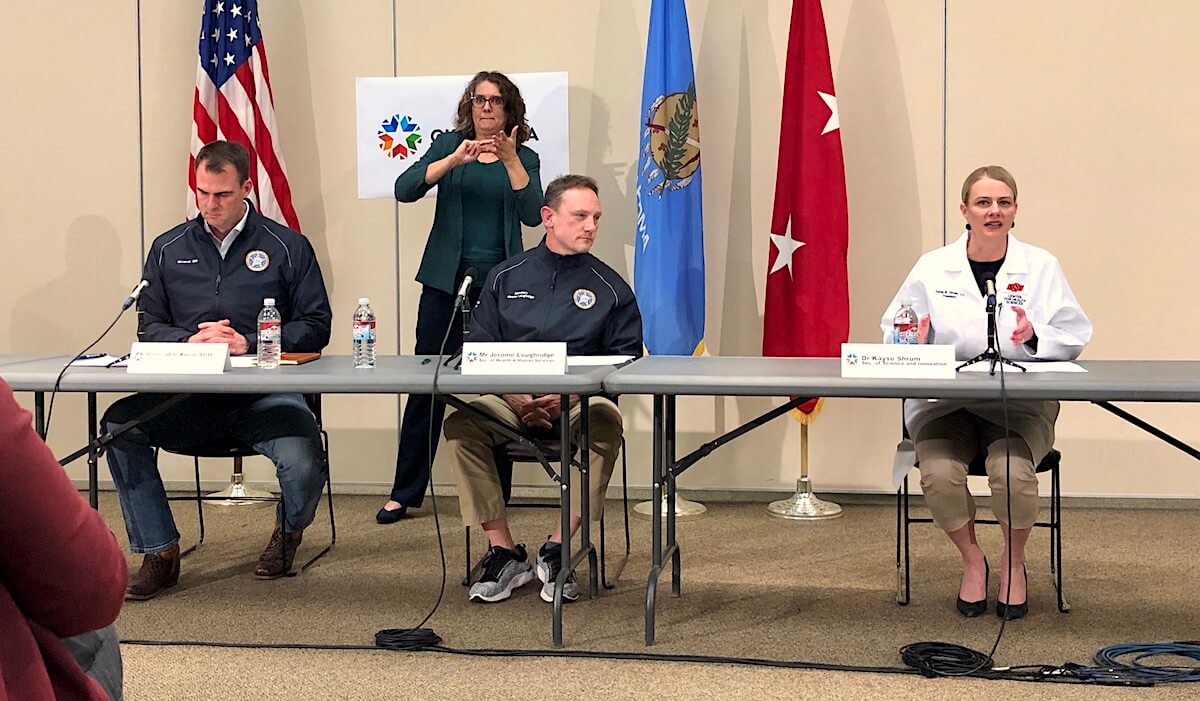
Spring 2020 has quickly turned from a time for social gathering to a time for social distancing. As COVID-19 has spread in the U.S. suggestions turned into targeted bans, which turned into widespread mandatory lockdowns. In Oklahoma, OKC Mayor David Holt and Gov. Kevin Stitt initially encouraged the continuation of restaurant dining before changing their tunes. Like mayors of Norman, Tulsa and other towns, Holt has now limited restaurant business to carry-out orders. Will lockdowns follow, as they have in other American cities and states? Consider:
- New York, California and Illinois have each implemented various levels of lockdown, telling citizens to leave their residences only for vital purposes. But Stitt, Oklahoma’s first-term businessman governor, said March 20 that he will not be urging more municipalities to close businesses: “I don’t think that is the government’s job.”
- Beyond bars, restaurants, theaters and gyms in Oklahoma’s largest municipalities, tribal casinos are also shutting down, with the final casinos scheduled to suspend operations by midnight March 22, according to Matthew Morgan, chairman of the Oklahoma Indian Gaming Association.
- Oklahoma’s public schools have also suspended activities until at least April 6, and the state has received an exemption for end-of-year testing. Oklahoma’s largest universities have moved their classes online for the remainder of the spring semester.
- Most of Oklahoma’s annual community events have also been cancelled or postponed, and with self-quarantine suggestions and requirements only growing, the question on many people’s minds is how long these measures — intended to slow the pandemic’s spread — will last.
Health care and hospitals
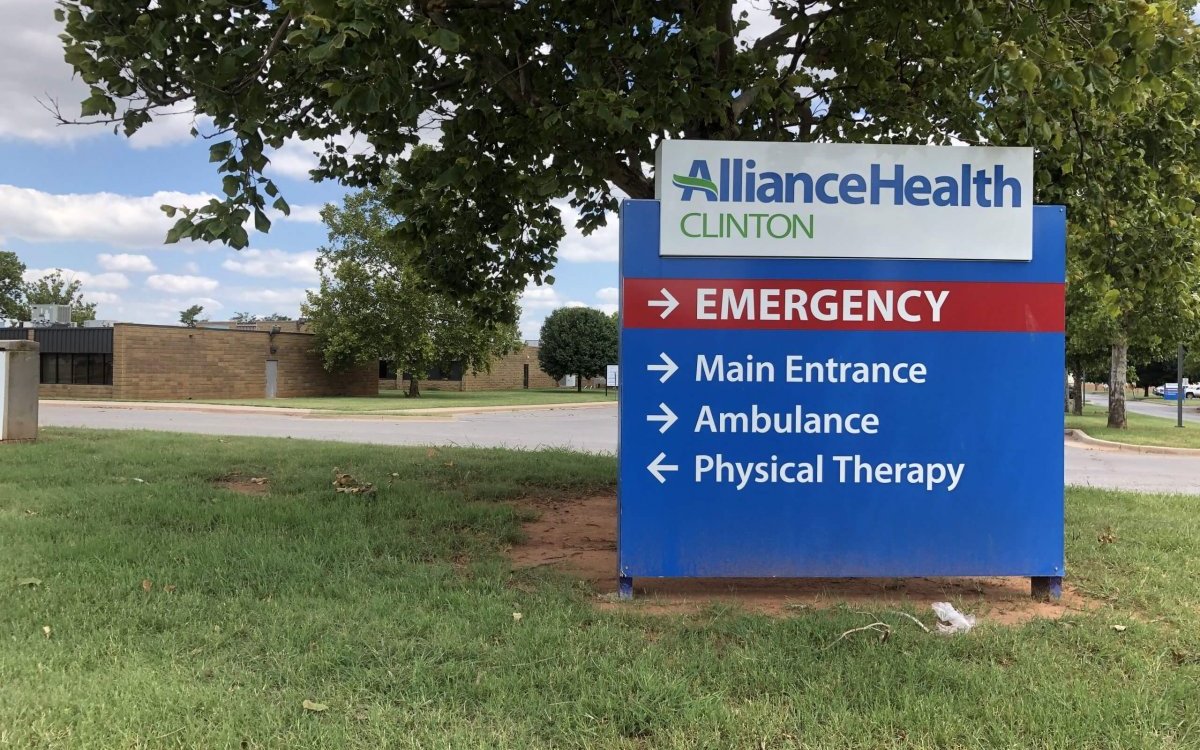
Many of the social-distancing recommendations and requirements now in effect are aimed as much at slowing the spread of COVID-19 as at stopping it. A primary concern is that, if the disease spreads quickly, health care facilities will be stretched beyond their capacities, with shortages of hospital beds, ventilators and protective gear. As the state’s hospitals brace themselves for a potential spike in coronavirus cases, consider:
- Several Oklahoma hospitals have placed temporary restrictions on visitors, limiting the number of visitors each patient can receive, screening visitors for COVID-19 symptoms at entry and banning them from certain areas.
- Five of Oklahoma City’s major hospital systems have announced that they are postponing elective surgeries and procedures. The president of OU Medical, Chuck Spicer, said the purpose of postponements is to protect patients and health care providers while conserving supplies such as surgical masks.
- In addition to the request from INTEGRIS mentioned above, Stillwater Medical Center posted a request on Facebook for donations of homemade masks to be used by non-COVID patients, so that medical masks can be saved for health care providers. “This is a perfect time to use up your fabric stash,” said the Facebook post, which also included a link to a pattern.
- President Donald Trump has been raising controversy by touting the effectiveness of drugs that are, in reality, still unproven. In the Oklahoman, Dr. Joan Merrill, of the Oklahoma Medical Research Foundation, explained why two of those drugs might show promise as a COVID-19 treatment, but cautioned that it is still too early to assume that they will work.
Businesses and the economy
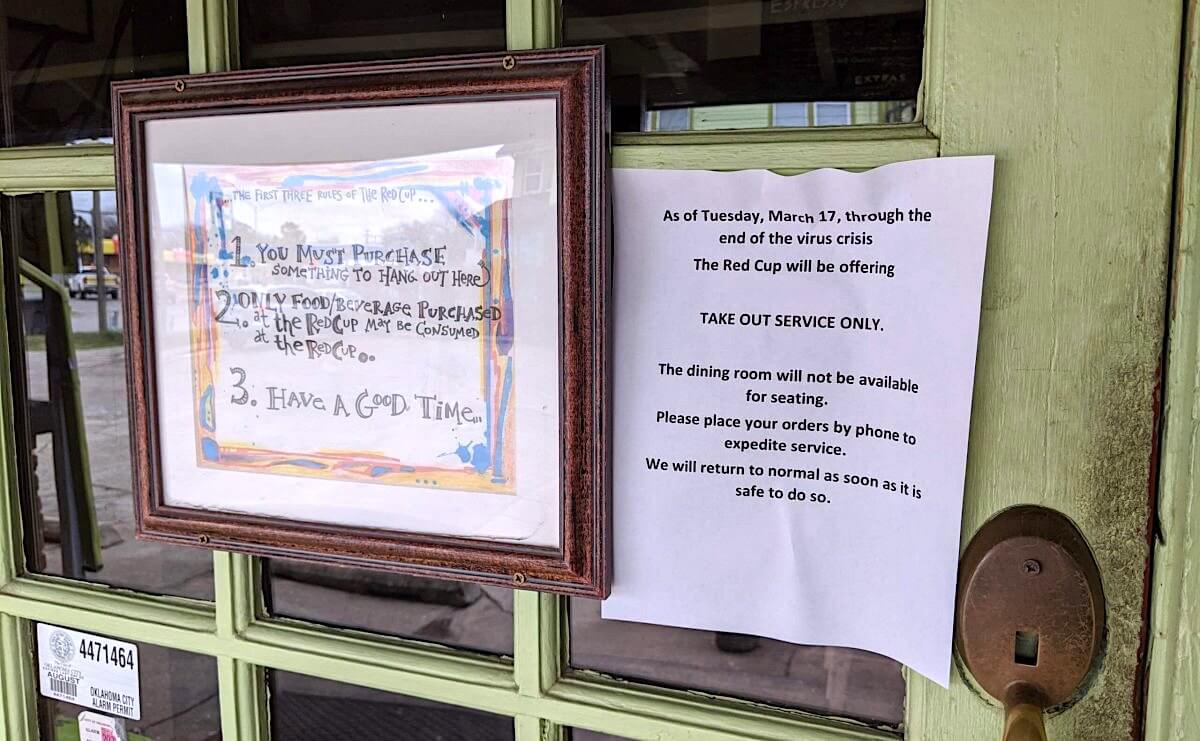
The economic fallout of the COVID-19 pandemic is perhaps just as concerning as the virus itself. Unemployment claims have ballooned in the past week and many businesses and workers are facing grave uncertainty. Consider:
- Sen. Jim Inhofe is one of four U.S. Senators who have been criticized for allegedly selling large amounts of stock after attending briefings on COVID-19 — before the risks presented by the virus were known to the public and before the stock market took a plunge. Inhofe has denied wrongdoing.
- Small businesses in all 77 Oklahoma counties may apply for low-interest disaster loans from the U.S. Small Business Administration, Stitt announced on Facebook on Friday.
- As Oklahoma City and Tulsa have seen widespread shutdowns of businesses, either voluntarily or by mandate, Oklahoma Watch reports that many rural communities, where the virus hasn’t spread yet, are carrying on with business as usual.
- Many musicians are using a combination of social media streaming capacities and the payment technology Venmo to busk digitally. In OKC, the bar Ponyboy has been hosting Live From Pony Boy sessions nightly on social media. The streams are free, but donations are encouraged to support the artists and bartenders.
Politics
The rapid rise of this pandemic has put our political leaders on the spot, demanding almost daily updates in tactics and policies. Normally noninterventionist figures have had to put strict, unprecedented measures in place. The response to the outbreak has often been marked by rare cooperation across the aisle, although there has still been some room for partisanship. Consider:
- On March 16, the Oklahoma Legislature adopted new rules for public meetings and restricted access to the Capitol in response to COVID-19. The next day, a legislative staffer tested positive for the virus.
- In a press conference Sunday evening, Gov. Stitt acknowledged that statewide closures are “a possibility,” while reiterating his statement from two days before that he doesn’t think the state should put restrictions on municipal governments.
- At the national level, Senate Democrats blocked the progress of a $1.8 trillion stimulus package on Sunday, arguing that it didn’t provide enough protections for workers and didn’t impose enough restrictions on big businesses that would be receiving a bail-out.
- On March 18, both of Oklahoma’s U.S. senators, Jim Inhofe and James Lankford, were among only eight votes against a bill to provide emergency relief in response to COVID-19. Lankford said, “this bill has a new government mandate on small businesses, which was intended to help, but I fear it will make a bad situation worse for many Oklahoma businesses.”
Philanthropy
Numerous churches, businesses and individuals are responding to the COVID-19 crisis by donating money and materials for specific causes. Among philanthropic efforts, consider:
- Paycom CEO Chad Richison has committed a $2 million donation to the Regional Food Bank of Oklahoma and is “willing to provide more in order to ensure that the food insecure are fed during this crisis.”
- Rudy Gobert, the Utah Jazz center who was diagnosed with COVID-19 shortly before his team was scheduled to play the Oklahoma City Thunder at the Chesapeake Energy Arena, is donating $500,000 to coronavirus relief efforts, $100,000 of which will come to Oklahoma City. Gobert was criticized for jokingly touching all the microphones at a press conference before he was diagnosed.
- Miller Lite is running ads on Twitter saying they have committed $1 million to U.S. Bartender’s Guild National Charity Foundation to support those who have lost paychecks during the COVID-19 crisis.
- OKC Fabric Market has donated more than 1,000 yards of fabric for the creation of face masks.
The press
In trying times such as these, media are relied upon as conduits between the public and decision makers, a role amplified as citizens are encouraged to stay home or even prohibited from accessing certain places. Our coverage of the novel coronavirus can be found here, but also consider:
- Last week, media were the only members of the public allowed into the Oklahoma State Capitol on March 17 as legislators pushed for a temporary-yet-sweeping change of the state’s Open Meeting Act.
- The Frontier, a nonprofit publication based in Tulsa, has been a leading source for COVID-19 information in Oklahoma. Their running coverage can be found here.
- Journalists also unearthed a chilling 2007 story from KOCO’s Jessica Schambach about how a pandemic could unfold in Oklahoma. “Officials tell us we are due,” said the state epidemiologist at the time.
(Editor’s note: This post was changed at 11:45 a.m., Monday, March 23, to include updated numbers.)












